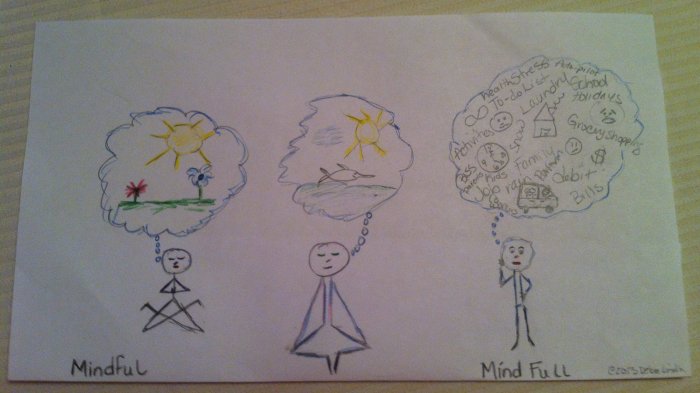Mindful or Mind Full?
As Jon Kabat-Zinn, Ph.D. (1990) states, “mindfulness is moment-to-moment awareness” (p. 11) where we pay attention to the things of ordinary life giving us new insights to our lives through relaxation, awareness, being present, and through insight.
Perhaps your mind is full with endless to-do lists, resolutions, and other stuff like shown in the drawing. How would your life be different if you stopped living with a full mind and instead lived mindfully? Today, make a stand to mindfully live moment-to-moment. Don’t worry about getting off track. As Jon Kabat-Zinn (1994) says, “If the mind wanders 1,000 times, you simply bring it back 1,000 times.”
Here are 8 ways to live mindfully:
- Be present. Have you ever driven your car only to not remember actually driving to wherever you were going? This happens to a lot of people and it’s called living a life on auto-pilot. Our minds are so filled with stuff, the to-do’s and obligations of life that we go through the motions and sometimes zone out. Living in the present means to be fully aware; mind and thoughts, physical and body – so, how we feel, how we think, and respond – moment-to-moment. Sure, we will experience distractions and with regular practice, we are aware of living in the presence of each moment, each experience; all experiences one moment at a time.
- Wisely choose words. Living mindfully also involves cultivating an ability to pay attention in the present moment. What words do we use as a means of communicating? Words are powerful; they have vibrations of positive and negative energies, and combine emotion with information. So, living mindfully – what words do we choose to use in our daily lives? Do we tend to lean toward negative or positive words? For example, do you workout or exercise? The word “workout” denotes working our bodies and has 3 definitions; one of which is about resolving a problem. On the other hand, “exercise” has 5 definitions ranging from the act of carrying out an agreement to regular use. The two words by social definitions mean the same; however, they are very different when living mindfully. So, be mindful of the words you choose and aware of the differences you experience.
- Just breathe. Ah….breathing. If we don’t breathe, well – we’re not alive. Yet when we experience stress or in conflict situations, one thing people tend to do is hold their breath. Holding the breath or breathing in short, shallow breaths only adds to the stress. Living mindfully means paying attention to our breath, experiencing the air flowing through the nose, filling up our belly and releasing; to sit with the breath, observe it, and stay with it…moment-to-moment.
- Unplug. Moments of non-doing? Yes! In today’s world we are connected like the Borg. Think about it. Our cell phones, computers, social media outlets; we’re connected to the world 24/7. Our whole lives are driven by doing and doing many things at the same time. How can a multitasking person be present, aware, and mindful? Recent studies show that multitasking is a performance hindrance. In moments when we are aware that we are not being our best, simply unplug. The act of non-doing restores some balance and perspective; by returning our attention to being present and focusing on the breath, we allow ourselves to return to the familiar place of being mindful.
- Stretch and rest. Exercise the mind, the body, the energetic self. Examples of stretch and rest come in many forms. Whether this is through meditation, yoga, or a combination of both. For some, it may mean taking a walk, sitting in a park on a bench, or doing the hokey pokey with kids. Stretch and rest is a way for your mind, body, and energetic self to switch from the doing to the being mode. By giving ourselves permission to be, we learn to practice awareness with patience; cultivating a level of gentleness toward oneself.
- Consume nourishment. The old saying “you are what you eat” is taking on a meaning today associated with our relationship to food. The practice of mindfulness comes naturally when we start paying attention to the domain of food, our preparation of food, and our eating of food. Great efforts go into buying food, preparing food, serving food, eating food, the environment where we eat, and the cleanup afterward. Being mindful about food involves being aware of how much we eat, how frequently we eat, the quality of the food we are eating, when, where, and how we feel after we eat. Do we feel well after a meal or eating certain foods? How do we feel when eating rushed as compared to a leisurely meal? What are our eating habits? What are our family’s eating habits? All of these variables come into focus when bringing mindfulness to the foods we eat. Eating mindfully means being present and being aware of what your food looks like, tastes like, and makes you feel as you are eating it as well as afterward.
- Do a do-over. Practicing mindfulness requires us to be aware of our own experiences, paying attention to the constant stream of reactions and judgments of life. A wonderful gift mindfulness brings is do-overs as we transform from the habitual categorizing or labeling things “good” or “bad” or “neutral” and move to acceptance, patience, non-judging, and letting go. Living mindfully, we pay attention to our intention, awareness, and our purpose. For example, living mindfully we may become aware of our reactions to life and through awareness we identify our patience, understanding, and purpose. Practicing mindfulness allows us to recognize our intention for being and purpose for doing.
- Make a commitment. Living mindfully won’t happen by itself or because a person decides it’s a good idea. Living mindfully requires a strong commitment to working on self and enough self-discipline to persevere in developing practices. Through regular practice, the momentum of practice helps a person to live mindfully.
References:
Kabat-Zinn. J. (1994). Sitting mediations. Series 2. [CD]: Louisville, CO: Sounds True Publishing.
Kabat-Zinn. J. (1990). Full catastrophe living: Using the wisdom of your body and mind to face stress, pain, and illness. New York: Bantam Dell.


Leave A Comment
You must be logged in to post a comment.